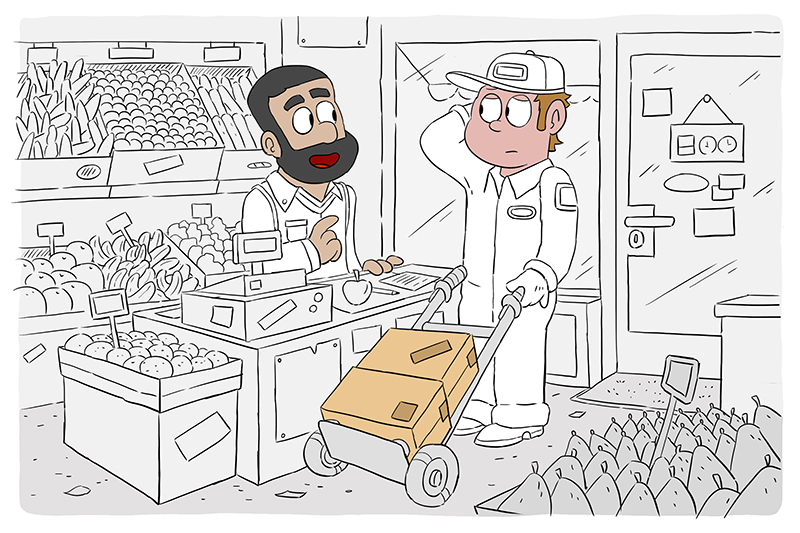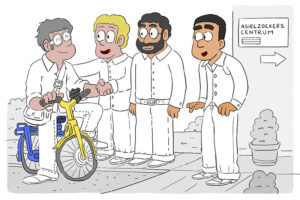
Mahmoud has opened a small Turkish store. He has only just started but the business is already running well, including sales to a Dutch customer, Joost. He has a starting catering business and comes every day to pick up two boxes of fresh fruit. Joost is still a young entrepreneur. Mahmoud wants to get to know Joost better so he can gain more confidence with him. Maybe then he can get a better price with him for the new orders. He suffers from more expensive purchasing and wants to negotiate.
Joost always comes on Tuesdays. He has just come in and Mahmoed asks if he would like a real Turkish coffee. Mahmoed talks about how happy he is in Holland and wants to know if he also lives around here with his family.
Joost is in a hurry. He always plans his day tightly. Mahmoud is a new supplier for him. It’s nice doing business, he’s reliable. And they are beautiful, fresh products. But he doesn’t have time for Turkish coffee now, that’s a whole ritual. And those questions about where he lives and about his family … Rather not. He likes to keep his business and private life separate.
Where is the connection?
Mahmoud likes to build rapport before talking about business and before negotiating higher prices. In his we-world, doing business can be likened to granting benefits to each other. Such favor tends to increase when you know each other better.
In Joost’s I world, work has nothing to do with personal relationships. It is about a business transaction between two parties. Joost finds Mahmoud a bit pushy. Mahmoud is relationship-oriented and Joost is task-oriented.
Moreover, the price increase will not depend on the personal relationship.
It’s all about the business facts. The quantity you buy, the payment behavior and so on.
Mahmoud can just address him, directly, about the price pressure. What also comes into play is that Joost is a customer, and there is a power relationship. Mahmoud will also be more sensitive to that. In the Netherlands, you are much less concerned with that.
He can take that task-focused Joost into account, by not offering a Turkish coffee this time, but giving Joost a box of Turkish dates. For Joost’s wife. And asking if Joost will continue to have a coffee with him next Tuesday. And the balance of power? At least Mahmoud has the advantage of being a lot older, so that lifts the power differential somewhat.
So just saying that current prices will have to go up. With some substantiation. Inflation, exchange rates.
Don’t beat around the bush for too long.
In short
For Joost:
- Accept that Mahmoud comes from a we-society.
- Relationships, giving and receiving hospitality are very important.
- Mahmoud also comes from a hierarchical society. It is normal for the customer to exercise power.
- Be extra alert to the other person’s body language.
- Mahmoud probably wants to discuss more than private matters.
For Mahmoud:
- Accept that Holland has a distinctly I culture and therefore say what is on their mind….
- Holland is egalitarian, so customer and supplier are also equal. The same goes for age, Mahmoud is not more powerful because of that.
- Try answering directly, without loose ends. The Dutch are used to being addressed directly.
Want to read more about culture dimensions?
Important to know
This anecdote is based on stories shared with us. Connect2Us strives to highlight the dilemma from both sides and not to label people or suggest that one or the other should behave differently. We see in our daily intercultural work that awareness by those involved is enough to move toward each other without pretending to be very different. Connect2Us aims to help readers recognize and avoid prejudice. Read about prejudice, discrimination and racism here.

